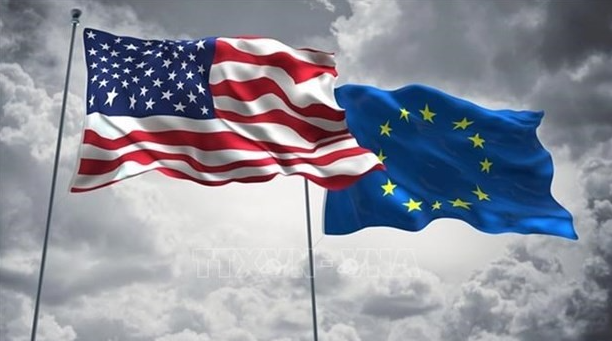US and EU agree to accelerate negotiations

JAKARTA – After US President Donald Trump announced a postponement of the 50% import tariffs on European Union (EU) goods, European leaders expressed strong hopes that the trade war between the two sides would soon end through accelerated negotiations.
Trump had initially set the tariff implementation for 1 June, but it has now been extended to 9 July 2025.
He revealed the decision to delay the tariffs followed a “very good” conversation with European Commission President Ursula von der Leyen.
Paula Pinho, Chief Spokesperson of the European Commission, said both leaders agreed to accelerate negotiations and maintain intensive communication.
In a move to strengthen dialogue, EU Trade Commissioner Maros Sefcovic is scheduled to speak again with US Trade Secretary Howard Lutnick on Monday afternoon (26/7), following their last communication on Friday after the threat of new tariffs.
French President Emmanuel Macron also expressed optimism. During his visit to Vietnam, as reported by The Guardian on Tuesday (27/5), he said, “There was a good exchange between Trump and Von der Leyen. I hope we can return to the lowest tariff levels that enable healthy economic exchange.”
Meanwhile, Italian Prime Minister Giorgia Meloni is reportedly working to arrange a direct meeting between Trump and European leaders in early June.
Irish Foreign Minister Simon Harris urged that the negotiation window not be wasted.
“Our priority is to reach a meaningful agreement. These high-level political contacts present an important opportunity,” he said.
The EU is still offering a “zero-for-zero” proposal to eliminate transatlantic tariffs, including those on cars and industrial goods.
EU Trade Spokesperson Olof Gill called the offer a highly attractive starting point for a mutually beneficial deal.
However, ongoing uncertainty caused by shifts in US tariff policy has made it difficult for many European companies to prepare financial forecasts.
While European stock markets rallied on Monday following the tariff delay, US markets were closed for a national holiday. The Stoxx Europe 600 index reversed Friday’s losses after the announcement.
Although 25% tariffs on EU steel, aluminium, and cars remain in place, Maros Sefcovic held a video conference with CEOs of Mercedes-Benz, Volkswagen, BMW, and Stellantis to allay their concerns.
If no agreement is reached before 14 July, the EU plans to impose retaliatory tariffs on US agricultural and industrial products worth €21 billion (USD 22.68 billion), mostly targeting Republican-held states.
The European Commission is also weighing a further round of sanctions on US goods worth €95 billion (USD 102.6 billion), including bourbon, vehicles, and industrial machinery.
Some analysts believe Trump prefers negotiating directly with national leaders rather than with multilateral institutions like the European Commission, in line with his often abrupt, personality-driven negotiation style.
Previously, Goldman Sachs analysts explained why negotiations between the US and EU are expected to take time.
For Washington, the high tariffs imposed earlier this year are viewed as leverage to extract major concessions from Europe. Meanwhile, Brussels sees them as the upper limit—meant to be pushed back to prevent escalation. (EF/ZH)